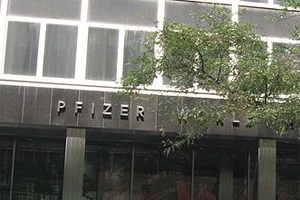
The lingering impact of patent expiries continued to affect Pfizer in the third-quarter, with revenues falling 2 per cent to $12.6bn.
The picture was even less rosy on profits, with net income falling 19 per cent to $2.6bn as revenue declines affected all of its business units, although chief executive Ian Read said there were bright spots, such as sales of Pfizer’s cancer drugs which rose 24 per cent to $407m.
Cholesterol drug Lipitor (atorvastatin) continued to slump following loss of patent protection in the US and Europe, with sales down 29 per cent to $533m, while Pfizer’s revenues were also pegged back by the termination of a collaboration with Boehringer Ingelheim on chronic obstructive pulmonary disease (COPD) treatment Spiriva (tiotropium) in some markets.
Offsetting the declines, sales of Pfizer’s non-small cell lung cancer (NSCLC) therapy Xalkori (crizotinib) rose 92 per cent to $73 million, with Pfizer predicting plenty of additional upside as the drug filters out from specialist oncology centres into more general use. Meanwhile Inlyta (axitinib) for renal cell carcinoma rocketed 186 per cent to $83 million.
Pfizer’s JAK inhibitor Xeljanz (tofacitinib) for rheumatoid arthritis – which was approved in the US a year ago – brought in $35m in the quarter and $68m in the first nine months of the year.
Growth of the product has been held back by the European Medicines Agency’s decision to reject Pfizer’s application in April, but Read said prescription volumes in the US showed 53 per cent sequential growth over the second quarter.
There were also gains for anti-inflammatory Celebrex (celecoxib), up 11 per cent to $752m, while fibromyalgia drug Lyrica (pregabalin) cemented its position as Pfizer’s biggest-selling product with a 10 per cent gain to $1.14bn in the quarter. Enbrel (etanercept) for rheumatoid arthritis and other inflammatory conditions – which Pfizer has rights to outside the US and Canada – climbed 6 per cent to $932m.
Despite the short-term issues facing Pfizer, Read was bullish on the firm’s prospects saying that over the next few months the company will report “key clinical data read-outs that will more clearly characterize the strength of our late-stage pipeline”.
He told investors that Xeljanz is in a number of phase III trials that could see its indications extended to include psoriasis, psoriatic arthritis and ulcerative colitis, with phase II programmes looking at its use in Crohn’s disease and a topical formulation.
Pfizer is also developing a once-daily formulation of the drug -currently given twice a day – that should be filed in 2015, he added.
Beyond Xeljanz, Read announced that bococizumab (RN316) a PCSK9 monoclonal antibody to lower LDL cholesterol is starting phase III trials this month that will include a dedicated cardiovascular outcome study, and it is also expecting late-stage results on NSCLC candidate dacomitinib in the first half of next year.
The company has also joined forces with Lilly to develop anti-nerve growth factor (NGF) antibody tanezumab for the treatment of osteoarthritis, chronic low back pain and cancer pain, with phase III trials planned for next year, and has begun pivotal studies of its Merck & Co-partnered SGLT2 inhibitor ertugliflozin for diabetes.
Read said that from next year will start separating out the financial reporting for the three business units – one for generics and two for branded medicines – created in restructuring drive announced in July 2013.
The news added weight to speculation that Pfizer is planning additional break-ups, given that it has already hived off its animal health division Zoetis and nutrition unit.




